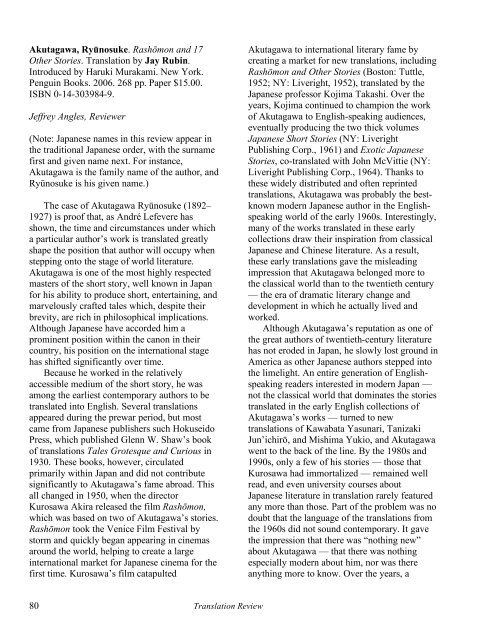Translation Review - The University of Texas at Dallas
Translation Review - The University of Texas at Dallas
Translation Review - The University of Texas at Dallas
Create successful ePaper yourself
Turn your PDF publications into a flip-book with our unique Google optimized e-Paper software.
Akutagawa, Ryūnosuke. Rashōmon and 17<br />
Other Stories. <strong>Transl<strong>at</strong>ion</strong> by Jay Rubin.<br />
Introduced by Haruki Murakami. New York.<br />
Penguin Books. 2006. 268 pp. Paper $15.00.<br />
ISBN 0-14-303984-9.<br />
Jeffrey Angles, <strong>Review</strong>er<br />
(Note: Japanese names in this review appear in<br />
the traditional Japanese order, with the surname<br />
first and given name next. For instance,<br />
Akutagawa is the family name <strong>of</strong> the author, and<br />
Ryūnosuke is his given name.)<br />
<strong>The</strong> case <strong>of</strong> Akutagawa Ryūnosuke (1892–<br />
1927) is pro<strong>of</strong> th<strong>at</strong>, as André Lefevere has<br />
shown, the time and circumstances under which<br />
a particular author’s work is transl<strong>at</strong>ed gre<strong>at</strong>ly<br />
shape the position th<strong>at</strong> author will occupy when<br />
stepping onto the stage <strong>of</strong> world liter<strong>at</strong>ure.<br />
Akutagawa is one <strong>of</strong> the most highly respected<br />
masters <strong>of</strong> the short story, well known in Japan<br />
for his ability to produce short, entertaining, and<br />
marvelously crafted tales which, despite their<br />
brevity, are rich in philosophical implic<strong>at</strong>ions.<br />
Although Japanese have accorded him a<br />
prominent position within the canon in their<br />
country, his position on the intern<strong>at</strong>ional stage<br />
has shifted significantly over time.<br />
Because he worked in the rel<strong>at</strong>ively<br />
accessible medium <strong>of</strong> the short story, he was<br />
among the earliest contemporary authors to be<br />
transl<strong>at</strong>ed into English. Several transl<strong>at</strong>ions<br />
appeared during the prewar period, but most<br />
came from Japanese publishers such Hokuseido<br />
Press, which published Glenn W. Shaw’s book<br />
<strong>of</strong> transl<strong>at</strong>ions Tales Grotesque and Curious in<br />
1930. <strong>The</strong>se books, however, circul<strong>at</strong>ed<br />
primarily within Japan and did not contribute<br />
significantly to Akutagawa’s fame abroad. This<br />
all changed in 1950, when the director<br />
Kurosawa Akira released the film Rashōmon,<br />
which was based on two <strong>of</strong> Akutagawa’s stories.<br />
Rashōmon took the Venice Film Festival by<br />
storm and quickly began appearing in cinemas<br />
around the world, helping to cre<strong>at</strong>e a large<br />
intern<strong>at</strong>ional market for Japanese cinema for the<br />
first time. Kurosawa’s film c<strong>at</strong>apulted<br />
Akutagawa to intern<strong>at</strong>ional literary fame by<br />
cre<strong>at</strong>ing a market for new transl<strong>at</strong>ions, including<br />
Rashōmon and Other Stories (Boston: Tuttle,<br />
1952; NY: Liveright, 1952), transl<strong>at</strong>ed by the<br />
Japanese pr<strong>of</strong>essor Kojima Takashi. Over the<br />
years, Kojima continued to champion the work<br />
<strong>of</strong> Akutagawa to English-speaking audiences,<br />
eventually producing the two thick volumes<br />
Japanese Short Stories (NY: Liveright<br />
Publishing Corp., 1961) and Exotic Japanese<br />
Stories, co-transl<strong>at</strong>ed with John McVittie (NY:<br />
Liveright Publishing Corp., 1964). Thanks to<br />
these widely distributed and <strong>of</strong>ten reprinted<br />
transl<strong>at</strong>ions, Akutagawa was probably the bestknown<br />
modern Japanese author in the Englishspeaking<br />
world <strong>of</strong> the early 1960s. Interestingly,<br />
many <strong>of</strong> the works transl<strong>at</strong>ed in these early<br />
collections draw their inspir<strong>at</strong>ion from classical<br />
Japanese and Chinese liter<strong>at</strong>ure. As a result,<br />
these early transl<strong>at</strong>ions gave the misleading<br />
impression th<strong>at</strong> Akutagawa belonged more to<br />
the classical world than to the twentieth century<br />
— the era <strong>of</strong> dram<strong>at</strong>ic literary change and<br />
development in which he actually lived and<br />
worked.<br />
Although Akutagawa’s reput<strong>at</strong>ion as one <strong>of</strong><br />
the gre<strong>at</strong> authors <strong>of</strong> twentieth-century liter<strong>at</strong>ure<br />
has not eroded in Japan, he slowly lost ground in<br />
America as other Japanese authors stepped into<br />
the limelight. An entire gener<strong>at</strong>ion <strong>of</strong> Englishspeaking<br />
readers interested in modern Japan —<br />
not the classical world th<strong>at</strong> domin<strong>at</strong>es the stories<br />
transl<strong>at</strong>ed in the early English collections <strong>of</strong><br />
Akutagawa’s works — turned to new<br />
transl<strong>at</strong>ions <strong>of</strong> Kawab<strong>at</strong>a Yasunari, Tanizaki<br />
Jun’ichirō, and Mishima Yukio, and Akutagawa<br />
went to the back <strong>of</strong> the line. By the 1980s and<br />
1990s, only a few <strong>of</strong> his stories — those th<strong>at</strong><br />
Kurosawa had immortalized — remained well<br />
read, and even university courses about<br />
Japanese liter<strong>at</strong>ure in transl<strong>at</strong>ion rarely fe<strong>at</strong>ured<br />
any more than those. Part <strong>of</strong> the problem was no<br />
doubt th<strong>at</strong> the language <strong>of</strong> the transl<strong>at</strong>ions from<br />
the 1960s did not sound contemporary. It gave<br />
the impression th<strong>at</strong> there was “nothing new”<br />
about Akutagawa — th<strong>at</strong> there was nothing<br />
especially modern about him, nor was there<br />
anything more to know. Over the years, a<br />
80 <strong>Transl<strong>at</strong>ion</strong> <strong>Review</strong>

















